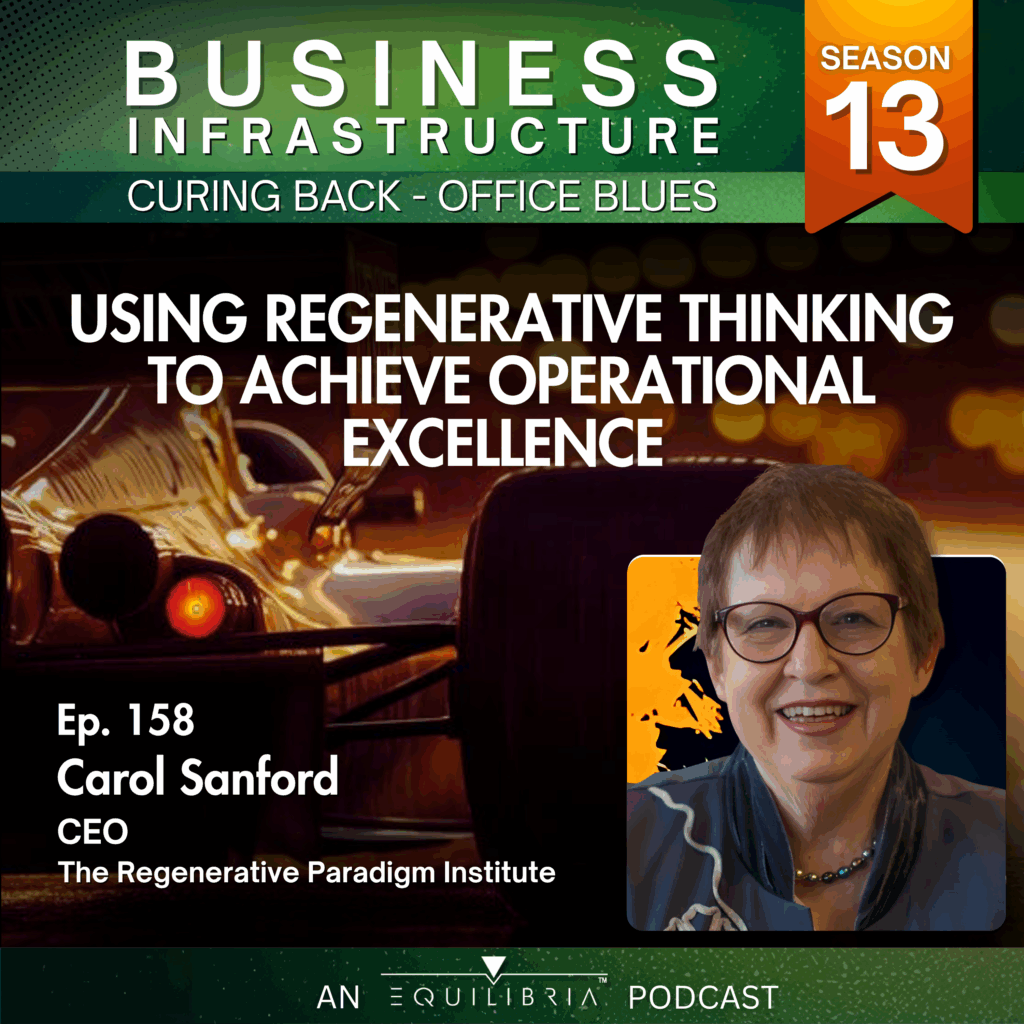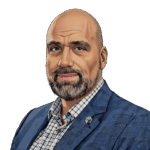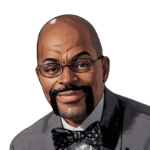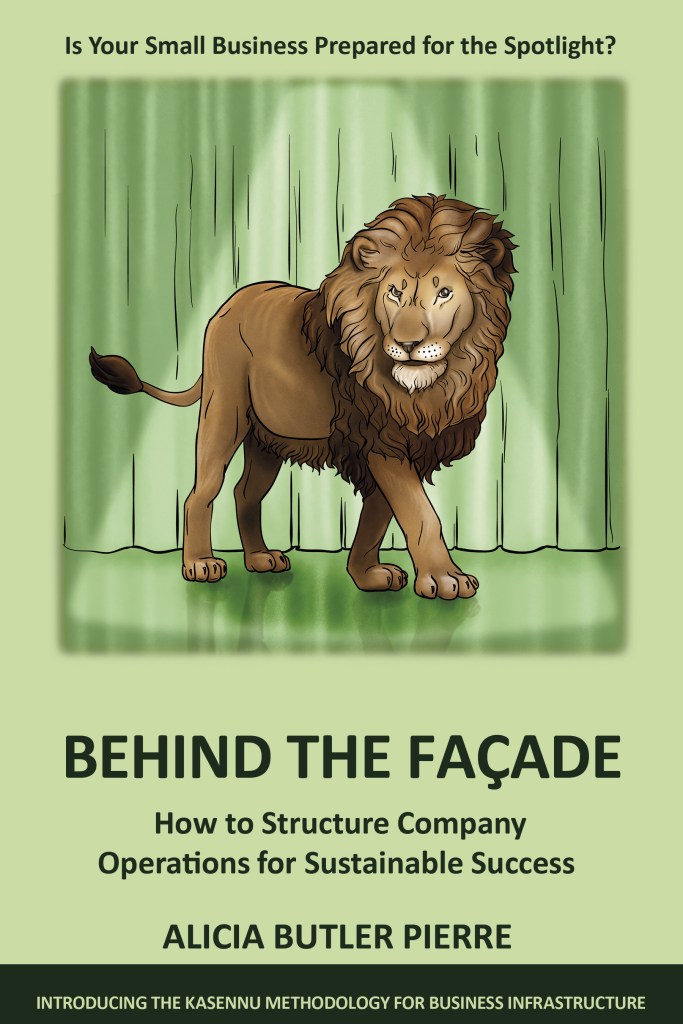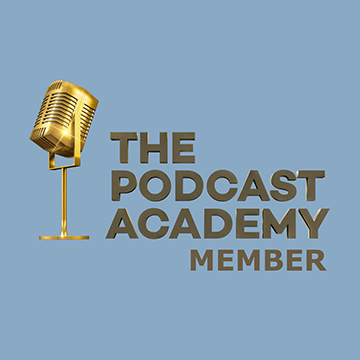Transcript
I must admit I’m guilty of referring to Operations as the quote unquote engine of any business, and I never realized the danger of doing so until this season. It never occurred to me to instead refer to Operations as the heartbeat of any business.
Hi, I’m Alicia Butler Pierre. Describing operations as an engine implies mechanization, which has direct implications on how we as leaders treat the people who work in operations. Heartbeat implies humanization and human beings think and feel and need breaks. In other words, they’re not machines. We’re about to embark on a journey with a guest who will train us on how to develop the mindset and the language that regenerates operations. What we’re talking about isn’t jabberwocky, doublespeak or double entendres. It’s about being intentional and precise with our language. This sets the tone for the clarity and culture in which operational excellence can take root and thrive.
This is season 13 episode 158 let’s start the show welcome to Business Infrastructure, the podcast about curing back office blues of fast growing businesses. If you’re a business owner or operator looking for practical tips and solutions to scaling your business business in a sustainable manner, you’re in the right place. Now, here’s your hostess, Alicia Butler Pierre.
Have you ever wished you had an on demand mentor that could provide advice on how to improve your customer experience and scale your business? HubSpot’s got you covered. Introducing the HubSpot Podcast Network. It’s a one stop audio destination for business professionals looking for education and and inspiration on how to grow better. With access to a collection of marketing, sales, service and operations shows, you’ll have all the information you need as your company goes from startup to scale up and beyond. Listen, learn and grow with the HubSpot podcast [email protected] podcastnetwork having a tough time trying to explain ideas over a video conference? Try the Think Smart Whiteboard. It’s the fastest whiteboard software in the world and allows you to upload flowcharts and write on them while your colleagues are watching remotely.
Call us today for a free demo. The number is 1-866-584-6804 or visit us online at getmytablet.com now that’s smart. Think smart. It’s season 13 everybody. And as you know, our focus is on operational excellence and you’re in for a real treat today because I have a feeling that this episode will be less of an interview and more of a mentoring session from our special guest. Now why do I Say that well, because we have Carol Sandford joining us today in Seattle, Washington. She’s the founder and CEO of several companies, so she’s definitely a serial entrepreneur. Those companies being the Carol Sandford Institute, the Regenerative Paradigm Institute, and Seed Communities.
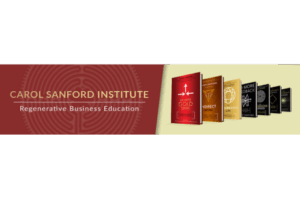
Carol is the best selling author of five books of which she’s received 22 gold awards. She aligns work systems to your company’s DNA. And over the past 40 years, she’s worked with leaders of uber successful companies like Google, dupont, Intel, Procter and Gamble and Seventh Generation, just to name a few. In fact, she’s going to share with us an operational excellence success story that involves Seventh Generation. There’s so much we can learn from Carol, so make sure you have your notepad handy because I know she’s going to be dropping some gems that you don’t want to miss. Carol, welcome to the show.
How are you?
Excellent. Alicia, thank you so much for inviting me.
Oh, it’s my pleasure. It is such an honor. I must tell you, I’ve just gotten. I’ve almost gone into a black hole of Carol Sandford’s world online. I’ve literally spent. No, seriously, no kidding. I’ve spent several hours just consuming your content. It’s so phenomenal. And you know, I chuckled, Carol, as I read the Beginning of your LinkedIn profile, in particular, because you made it clear that you are not a coach or a consultant.
So how do you describe yourself and the work that you do?
I’m a resource. And resource means literally like resource, returning people to themselves as a source. The reason I say I’m not a consultant is because consultants come up with programs and practices and they teach you how to do them after having sold you on that. They’re the best thing since sliced bread. Coaches are the same in that they work with people to get them to be a particular way based on some template, the enneagram, one of four types, or some humanistic approach. They leave out completely that the other people have within them. If they can build the capability, they have the ability to lead themselves and grow themselves.
So for me, what I’m doing is providing increased capability for consciousness, for being able to think through frameworks, being able to see through living systems. In other words, building the mind that can be a resource to themselves.
Wow. I’m actually speechless. But, you know, it ties in so nicely with. I noticed this word too, a lot across many of your, you know, as I was watching your different TED talks and looking over the different websites. And that word is regeneration. Yeah, and I love the name of one of Your organizations, the Regenerative Paradigm Institute. And it’s funny because I know there’s a reason you use that word in particular in comparison to, let’s say transformation, which is what we kind of spent last season of this podcast talking about. In particular, digital transformation.
So I’m wondering, Carol, can you also explain to us why you specifically use that word regenerative as opposed to a word like transformation that we oftentimes see in the world of business?
It’s very similar to what I was saying earlier. First, I am very, very precise about language. I don’t mean transformation when I say regeneration. I don’t mean change of any kind when I say regeneration. Regeneration is a term and an idea and a process that only happens in living systems. It does not happen in a machine. It does not happen in a part that’s been dissected. Apartment Only human beings, living systems, non human. Anything that’s alive and growing and creating transformation, which is one process within regeneration, can really regenerate. You talked about being able to discover your DNA. Well, it’s the being DNA, not the functional. Let me tell you my definition of regeneration.
You’ll see how it relates to why I call myself a resource. We is the same word. It’s a return to, but it’s a return to the essence of an individual, unique entity. So regeneration means, for me, it has six words, evolve, capacity. So again, you notice earlier I talked about we don’t give somebody a way to be a program, a best practice, an ideal. Instead, we evolve their capacity to discover for themselves, to build their own thinking.
Secondly, we’re evolving that capacity for essence expression. By essence expression, I mean who you, Alicia, are. You are not Carol, you are not your mother, your brother. Even if you have a twin, you are born with and have your own essence, which represents that which, if it were taken away from you, you wouldn’t be you. And so regeneration is about first two terms, evolving your capacity to express your essence. Same thing would be true of a child or any raw material like TiO2. But the key here that makes it more systemic is it’s for the essence expression is for systems actualization.
Now, you’re used to hearing, I’m sure, the term in your work, self actualization, and that was a term that Abraham Maslow came up with. But it stops incredibly short. Because if I am actualizing me, I’m making me better, but I’m not living the life that’s possible and needed for me. The meaning whereby I help whole systems actualize the regenerative Paradigm Institute, which you mentioned, works a lot with organizations and institutions thinking that their work is not about a cause or a piece of something, but a whole field regenerating. Quick example, if you end up working on social justice by working particularly on how we get people out of jail who shouldn’t have been there, we make the system fair.
We don’t really think about and ask the question, what is the system that really makes social justice what it is? What’s the social justice system? And if we begin to think about that, we can work in a more nodal way where we work on particular things that can change the whole. So regeneration is about evolving capacity of each and every unique living entity to express its essence into the world in a way that promotes and creates system actualization. That’s a mouthful. But does that make sense?
It does. Wow. I mean, you’ve really broken it down now. You mentioned six elements, so I have evolved capacity, essence, expression, systems actualization.
Six words.
Oh, six words. I apologize.
Capacity expression or system actualization?
Wow, that is so awesome. And it’s something else that, that really resonated with me as I. As I was doing my research on you, Carol, is that I kept thinking the expression experience is the best teacher kept coming to mind.
Yep.

And So you have been at this for over 40 years, and you aren’t just working with your clients based on research that you’ve done. You’re drawing from your own experiences.
And I read that you actually started and sold. You’ve already started and sold two businesses, and now you have. Sounds like three active ones going on as well. Plus, I know you have your podcast. There’s also a summit that you have going on. Can you talk about that a little bit more? Also about why that’s so critical. It’s one thing to do the research, but to have the actual experience, that just puts things into a completely different perspective.
Well, I have an epistemology I come from. And let me tell you remind you, if you don’t remember your philosophy. Epistemology describes various ways we can come to know or understand something. The primary one we have at work in the world today is an expert epistemology, which is somebody goes and does the work, the research they codified into some program, and then they sell it and teach it to other people. And people never actually test it, question it, apply it, except as given to them. The epistemology which I work from is you learn from life. You learn every day from life. And not just by the experience, but by Learning to reflect and to bring consciousness to what you’re doing.
So when I work with people, I teach them a lot about reflection and about different kinds of frameworks they can use to examine and make sense of things that are going on in the world. When they have that kind of opportunity to reflect now, they can actually make use of life. Otherwise they tend to be at the mercy of life and the world feels like hard knocks and it feels like I don’t have control of my own life and I have to change jobs in order to get something to work or change spouses, or change countries.
Rather than understanding that whatever comes to us, if we have the capacity again evolve capacity to really examine our relationship with people, with institutions, with our reactions to the world, then we can grow us so that we are increasing in charge and leading a life that can do this big system actualization bringing about large change. In fact, could I mention, Alicia, I have another new book coming out this fall and anybody who wants to be a pre reader can send me a note and I’ll offer it to you.
Well, one of the things I’m talking about in that book is that we have to stop trying to do things, make it all about doing and change this and that and the other is to learn to work on this indirect path of helping build capacity because it is so much faster, deeper and more effective to help other people have capacity than it is to try and change their behavior. So that’s why to me that you really want to learn from life by reflecting with more powerful frameworks than you normally do.
So it sounds like you are advocating for, especially if we talk about from an operational excellence perspective. So you know, within the workplace. But it sounds like before you can actually achieve something like operational excellence, you have to first, work on your own internal capacities first before you can talk about expanding the capacity of let’s say, wherever it is you’re working. Is that right or no? Did I get that wrong?
There’s some truth, I don’t know. At first that was all I was stumbling over. I would say simultaneously. So let me give you an example of when I work with a company kind of generally, and we’ll come back to the specifics when we talk about seventh generation. Every organization I go into, I meet with them without a program. I don’t say here’s the subject. I say we’re going to meet monthly, for a day, a month. So I went to South Africa, Colgate, Pamale, and we met a day or two, in many cases a month. And Started capability for internal reflection and external functional excellence like you’re talking about.
So I was teaching them how to do a different kind of decision making that was more systemic. While they also worked on their own ability to observe themselves and notice what made them reactive, what hooked their ego, what gave them the ability to be purposeful. And they would stop and reflect my request and their own choice ever so often and say, what’s getting us hooked here and distracting us, fragmenting us and how do we work on that?
But see, same time I had them doing strategic thinking. What is the essence of this business? What is the market intersection? What are our buyers and users lives like and what can we do to improve them? And people were committing to make big changes in the lives of the consumers and stakeholders. And they had to work on themselves in order to do that.
So another way of saying that is you’ll work on actualizing the system and you do actualizing of yourself in order to serve that, not for your own aggrandizement. So yes, you need to have that in place. But I think they work better in tandem.
In tandem. Got it, got it. So when it comes to operational excellence, Carol, how would you define it? What does it mean from your perspective?
Well, I actually don’t use that term very often, but I love that you did. And so I did. But here’s one of the ways I think about it. If you are a business and you have three kinds of excellence you have to work on, one is business excellence, one is functioning excellence, and one is organizing excellence. Business excellence means, and I usually say business effectiveness, but they’re related, is about your customers, clients, consumers feeling their lives transformed.
Because you’re able to create work, to function in a way that’s highly effective. So you can organize work, you can bring technology to bear, you can manufacture and supply systems, you can do all that with excellence. But the third one is organizing excellence. So the way you’re using, and I think I’m using, operational excellence is more like functional functioning excellence.
But the organizing excellence is key to the functioning infrastructure and to business because it is about people, how it is people think, how we structure work for them to work together, how they get smarter over time, how they build a different kind of motivation and become self directed.
That’s the organizing excellence effectiveness that ensures the work of functioning and operating excellence in order to be business effective. To the people who count on you to do the work, to bring the products, bring the services that their lives only work well when you do it well.
I love that you said that because it’s funny. After we take a break, we’re going to talk about what business infrastructure means so that we can get into that case study that operational or functional excellence exercise or case study that you’re going to share with us. But we also talk about there’s basically three elements of business infrastructure. It’s interesting that I think you and I are, we just, we’re in essence saying the same thing. We’re just using different words to describe it. But I love, you know, this, this idea of three types of excellence. Business functional as well as organizing and functioning.
Not functional functioning. And that makes it alive. Functional means we divided up, put in functions and we fragmented. Functioning means I every day, in every action in you and I together can figure out how to function in a way that we’re alive and fresh and so forth. So I am always careful to put the ring on it so that it’s alive.
I love it. You know and like you said earlier, you’re very intentional with the words that you’re using, So thank you for that correction.
it’s so important and we’re going to take a quick break to hear more from our sponsors. But when we come back, I’d love to explore one of your operational excellence success stories with your clients. 7th Generation as your business grows, things get more complicated. A CRM platform that has been cobbled together gets clunky as you add more users data and processes, slowing you down just when you need to speed up. That’s why HubSpot built a powerful CRM platform that’s easy to adapt to your customers expectations and changing business needs. It’s built from the ground up to help you solve for that complexity, not add to it.
With HubSpot you can customize your CRM platform to meet new customer expectations, move quickly when new opportunities emerge, and easily manage a growing user base as your company scales. With out of the box automation tools, a centralized customer database and a scalable platform that’s delightfully easy to use, Your team can pace with the changes in the world, however unexpected they are. With over 650 ready made integrations, HubSpot makes it easy to add the world’s most popular apps to Your tech stack allowing you to adapt to your customers needs. Always. Learn [email protected] there’s something else that stood out for me, Carol, as I again was doing my homework on you, and that’s the fact that you challenge best practices presented by traditional business publications. For example, I think in one, something that I read, I think you even mentioned the Harvard Business Review or Harvard Business School.
And one of the things, and again, I was just like, oh my gosh, that it just really resonated with me. And one thing that I read in particular when you mentioned, for example, using machine metaphors to discuss people or to describe say, a non manufacturing type of company. And that’s so true. We tend to do that. And so because of that, we start to think of people as machines. But they can’t just be the twist of a wrench or the oiling of a hinge and then everything is all okay again and it’s. And they’re working properly. That’s not how it works. But you know, speaking of people, that’s one of the elements, as I alluded to earlier, of what I call business infrastructure.
And for those who are listening to this show for the first time, business infrastructure is an operations system using Carol’s word for linking people, processes and tools to ensure that growth happens in a profitable and sustainable manner. Now, one of your clients that you’ve done some amazing work with in terms of revenue growth is Seventh Generation. And honestly, I had never heard of them, but I know they were sold to Unilever or Unilever, however it’s pronounced.
Carol, using this, these three pillars or elements of business infrastructure. The people, the processes, and the tools. I know you have several success stories that you can share with us as a result of working with this client in particular, but can you share one of those with us first?
Tell us what was the challenge or the issue or problem that they were looking to solve and how did you kind of take them through your process to achieve that operational or functioning excellence?

if people ask me or tell that they have a problem or an issue to solve, I won’t work with them because they’re starting in the wrong place. I only work with the business who wants to grow and wants to make a bigger difference in the world.
What can do? And I don’t quite relate to your three terms, they include tools, the way I hold it. And what happened with Seventh Generation is they were led by the founder, Jeffrey Hollinger, who wanted very much to be able to change the course of history around the role business played. By the way they make non toxic personal care and household care products for families and their households. When Jeffrey met me, he said, I have wanted since I was a young boy to make a difference in people’s lives. I tried nonprofits and I found it wasn’t rewarding because people didn’t take it as seriously. So I started a business. But I keep getting really focused only on the making a difference. And I know I’ve got to do it through the business.
So I want to learn how to grow a business by growing me. I said, all right, we got it. So the first place we start is and let me give people a little the outcome so they know why we’re telling them the story. Seventh generation, after the first five years we worked together, grew this consumer products low margin business which was competing with Procter and Gamble and all the people who made everything that cleaned your house or cleaned your body or covered your baby’s butt and cleaned them. And if you know anything about the industry, you know it’s very hard to grow the business.
And you’re constantly competition, discounting. And what we did was grew that business. And Jeffrey has published this, he published it at Harvard Business Review, all of his books. Anybody who asked him, he will say, what we did was we changed what we thought business was about. And in that process it changed my life. If you go look on my website, he says, it changed my life. And he’s now the board of Unilever.
And we grew the business 35 to 65% a year in revenue. That’s unheard of. We created margins which were double the rest of all of the people who are in consumer products industry. And they built earnings so they could be investing in things that were way beyond what the company did, including helping Hispanic women form co ops to use more healthy cloudscreen materials. They grew the business at a rate that was unheard of. And none of that was done by the normal ways you would think. What we did is monthly. As I mentioned before we met and I introduced a very different way to think about running a business. One of those aspects was knowing what the essence of the business was about. And most people misrepresent and misunderstand what I mean by business.
I don’t mean brand, I mean what was the story at the founding that came from the founder, Jeffrey Hollander. In this case, that really drove everything and it’s actually caused everybody to come to work there because they can feel that. So example, Jeffrey Holler his essence Which I do that work first when I get there. And like with Dupont, I did it too. But we did it with Ei Dupont, who’d been dead for, wow, 170 years. Company was 200 and something years old. But seventh generation, Jeffrey says, was ensuring transparency. And also he was opposed to anyone who said one thing and did something else. He couldn’t stand it drove him crazy. So we built a whole company around that. We were the first one that ever created a report that told people everything they’d done in the company fully transparent. We put all of the ingredients, which were not required by law, still aren’t on the package. And if anything ever didn’t work inside their production process, it was blasted as a press release. I mean, who would do that? Tell them when one of your chemicals turned to formaldehyde, well, they pulled them off the shelf, they told them everything that they were doing, and they eventually made even wages, everything transparent.
Plus they called out, as part of what they were doing, anyone like Walmart who was claiming they were doing one thing and doing something else, but they did it and then invited them to have a conversation with them about integrity between their words and their actions. Jeffrey Holler was invited by Lee Scott at the point he was CEO and president and helped them look at how Walmart could do much more work with climate change, how they could help their suppliers print their own ingredients, reduce packaging. All that was a part of the offering of seventh Generation. The number of people who learned about Seventh Generation from just being the authentic transparent company, who was an authentic voice for the truth and helping companies learn to do that, was what they were about. Now, that’s weird, right? But that’s where we started. And we redesigned products, product lines, and all I did, I gave them no programs, I gave them no practices, I gave them no ideals, no competencies, no steps you go through. What I did is taught them how to think from essence, and not just their essence, but essence thinking. And that grew them 35 to 65% of revenue, got them bought for a record price for a kind of ordinary company. And Unilever now keeps them as one of their major stories to help all their other brands grow. So I’ll pause for a moment.
Yes. So I’m wondering, when you say that you teach people how to think, what exactly does that involve?
All right, most of us don’t understand that we have a way we think. And it like there was a woman this morning in the place that I am, we were in a meeting and she was saying, I just don’t see how people can think that way. It’s just wrong. And I said, well, what about how they’re thinking? Is it? And I gave her a framework which is what I do when I talk about how to learn to think better.
Most of us think in a two term system. Like she was, they’re wrong and I’m right. And I said to her, well, what if they see you as wrong and them as right? She said, well, they’re just wrong. And I said, could you conceive of that? They might have a different paradigm, they might have a different worldview, they might have a different philosophy. Well, it would be wrong. That is what 99% of people do. They have one way and everything else is wrong.
So there are two terms. When I’m working a company, I ask them to learn to look at a three term or more system, learn to bring more into your thinking and we call it the law of three. Or when I talked to you earlier about being reactive, ego and purposeful, that’s giving you more perspective. So you can see she was being very reactive to these other people. She couldn’t even quite yet get up to ego and think, well, I have a way. I got there, but I can see now it’s making it all about me. Compared to a purposeful way of viewing the world would be being able to see how are different people seeing things? Why? How could we be in a conversation that opened up perspective and we each could learn and grow. If you think about any company you’ve ever worked in, most people have chosen sides. It becomes political. They hate their bosses or love their bosses and compete for position.
It’s all two terms. Learning to get out of two term polarity, thinking. It’s one example out of hundreds that we work on to help people learn to have depth of thinking, perspective. I also teach them about how to notice they’re in different paradigms, they’re in completely different worldviews. It’s not that one is right and wrong. They’re seeing the world from a different position. One of them, as you mentioned, is a machine view. Everything is a machine, including your brain. Another is a behavioral view, which is everyone is a rat. So they’re not a machine, they’re rat, a cage, right? In a maze.
You give them cheese at the end and you give them incentives, rewards and you’ll get them there. That’s a whole different very destructive worldview if you look at what it does to human beings. Or there’s the humanist do good idealist view where we decide what’s good for other nations, other people, and we impose it on them. And then there’s the worldview of regeneration, which is each person has their own unique essence they’re seeking to express. We can help evolve their capacity to do that, and then we all can do more. So that and a hundred other ways, a thousand other ways of learning to see that we are not in charge of our own mind. We let it run us, and then we let it run other people by how we engage with them. And then we let it run our businesses and our nation and the planet we live on. Just because we can’t see their own mind is we’re not conscious and we’re not choosing how to think about things.
So are these exercises that you’re taking people through.
No, I don’t do exercises. I do concepts that then you apply to work immediately. So if you came into a room with me, like in South Africa or in seventh Generation, you come in for the day and I say, we’re going to learn about modes of behavior today and we’re going to learn about Law 3 or we’re going to learn about paradigms. And I say, pick something you’re trying to work on right now in your company, in your team, in your market grouping you’re working in, and you’re going to apply it to this. Because everything I give will improve your ability to think about any subject. But we don’t do exercises like eliminate stands and playing games every minute.
Everything I bring is instantly applied to the business and people work with me sometimes 20, 30 years, but a minimum of three years and you never see the same thing twice. Because what I’m doing is building the mind that can see more. They can understand how it’s thinking from constantly being given a new framework, reactive, ego, purposeful, or something else, and being asked to apply it to what you’re working on right now. There’s no problem. I don’t work on problem solving. I do teach people eventually a regenerative way to work on problems. But if you start on problems, you’re mired in existence and trying to clean up the mess you’re in. You have to free the mind, shake it loose, unlearn all the old mental models we’ve got. And you only do that by over a weekly, monthly, quarterly, annually basis, working with the new way of thinking.
And so as a result of working with you at least once a week for three years at a minimum.
Once a month. Sorry, are these leaders who’s being invited into the room.
So it’s never hierarchical. There’s no cascading.

There are a variety of ways. There’s no set way. But it always says something like a core team who is using it, that it’s made up from top to bottom, cross functional, but it’s reflective of the whole. And then they are like a spider web GR going out into the organization. Not cascading, but they’re doing that in a way they don’t go teach it. Like, if you took Six Sigma, you would teach what you learned to the next person who you don’t know. You don’t teach it, you go apply it. And then there are different kind of teams formed and they’re working with different kinds of framing.
And everything I do is tied to the external world, to the customers, to the. To earth, to communities. So that you’re always designing how it is the business transforms the outside world. Not for their own benefit only, although 35 to 65% revenue growth a year in bad. Right. But you’re doing it so that you grow the life of people. Like, I worked with a Lowe’s hardware subsidiary, Orchard Supply, and they had 3,000 locations around, mostly the west coast, but some in Florida. They measured and talked about every day who came into Orchard Supply, what they were building, what it was they were doing in their garden or their home or in some community effort or school. And they told those stories and worked to transform their lives. That’s what all the work is focused on, not an exercise and a new practice for the company to do.
Okay, I think I understand.
Well, you can’t, because, I mean, not because you’re. There’s nothing wrong with you. It’s never the same. And I’m giving you a broad idea. And it never looked exactly like that anywhere. It’s all designed. I never did the same thing twice, ever. Because the world has changed. The people who are working with change. And you design based on what you can see there. And then next month I design based on how far they went. And next month I design based on how far they went. I don’t have a program that you go through for three years. And what’s so exciting is people who come work with me, and there are thousands of people using my work now.
I’m standing on the shoulders of great people and through centuries of development of the way I think. But what you see is that they are excited because they can say, my gosh, I never saw you do that. I said, I Didn’t know it a year ago. I didn’t understand it. I didn’t have that way of working. I am a living, changing, evolving being. Keep showing up and we will keep moving the world at an incredibly steep pace together.
thank you. And it’s through having this development of the mind that you’re able to accomplish. What is it that the three. I want to make sure I say it the right way. The three types of. Yes, yes, absolutely. So, you know, you mentioned, or you, you hinted at the fact that some of what you’re Talking about comes from ancient teachings and philosophies. And I know I was listening to one of your TED talks and you were talking about one of your grandfathers who was Iroquois and some of the things that you learned from him. And so that was a really profound TED talk. I think it was the one at Berkeley. Was it the TEDx Berkeley talk? I believe that was the one, yes.
I talked about my book, the Responsible Entrepreneur Entrepreneur, which was based on four archetypes which are used by the Iroquois. My grandfather is half Mohawk, which is one of the Iroquois nations. And those were so profound to me that they’re a way of putting on an archetype and it causes you or invites you to be able to see the world differently. And my grandfather constantly did that. He said, well, if you were a warrior, how would you see it and why suddenly I’m in a different world. And if you were a hunter and if you were a clown and if you were a head man or head woman. So I wrote a book using that set of archetypes and it’s very. And I did a different. My fifth book, the Regenerative Life, is based on nine archetypal meta roles and how those roles help you see the essence of something that you’ve been misinterpreting.
And speaking of your books, well, this, this kind of. I knew this was going to happen. I know we’re going to spend quite some time just talking about resources because you alone have five books, you have a podcast, there’s the Regenerative Business Summit, and I’d like for you to talk about all of these things. But if we could start off with your books.
So you have five best selling books. You’re working on a sixth book that’s scheduled for release later this year, 2021. Can you tell us. Yes. Can you tell us a little bit more about your upcoming book?
All right, I have to tell you about the first five Books.
Okay, sure, go ahead, go for it.
The first book was the Responsible Business, which was about looking at whole ecosystems and how a business can grow and make itself more useful, more meaningful in the world by understanding all the stakeholders. I had a lot of people afterwards said, well, you’re writing stories about big corporations you work with. How about us little guys?
So I wrote a book called Responsible Entrepreneur, which I spoke to, which were entrepreneurial businesses that actually changed the course of history. And by the way, all of my books are story based. There’s Never less than 13 case stories in each one. So then I had people do a little what you were doing. So all that’s great, but I don’t understand how that comes down into a company design, a company at work. I said, okay. I wrote the Regenerative Business, which was more about work design. And that’s where I started critiquing a lot of how businesses are structured and when they try and create getting rid of supervisors or something nonsensical. And so then in that book I wrote about 30 toxic practices which come from those areas.
We were talking about the machine view, the animal behavioral view, the do good and the living systems. But I decided to start writing a separate book on each of the 30 toxic practices. I’ve only done one so far and I’m getting old, so who knows. But it was called no More Feedback. And I took the history, the philosophy where in the world did the idea of 360 and other kinds of feedback come from? And showed how it came from machines and how you run machines and why it is antithetical to building consciousness. And that book, speaking of excellence, Tom Peters, who wrote In Search of Excellence, says it is the best book of the century so far. And he’s got a big wonderful quote on my website and of course he has the top five best selling book in the history of business book.
Then I had individuals come to me and say, but you do this all for corporate leaders. What about us? So I wrote the Virginity of Life, which is about parents and designers and earth tenders and educators, media people, citizens, coaches and who, what else could they do? And economists. So I wrote that book for individuals to look at how in their roles in life it could change them. Now the problem was that people don’t get it when they read my book. They keep trying to find the do. And like my most people at the end of the interview say, well, what one thing they could go do? And I say, please don’t go do anything because you’ve still got the old mind you had when you started to listen to me. What you want to do is build the new mind. Well, what does that mean? And I’m talking about, I use a lot of stories from Phil Jackson, who I worship in some ways, who was the coach for the Chicago Bulls in the Los Angeles lakers and won 11 national championships. And what Jackson did was never worked on people becoming better basketball players.
He worked on them becoming better humans in relationship to other humans. And I call that indirect work. And I tell the story of Jackson and why he got and why nobody can see it. They think, well, he must run drills. He must have a, a method somehow that makes them better players. No, he makes them better people or he helps them make themselves better people. So how is it you build the mind and build the being and build the will that you can do the kind of things my other five books are about that is called indirect work. And it’s a living system theory of change which would change every role in every business, in every education, in every family. And I tried to tell people how to do that.
Now, for those who are listening to this right now, Carol, and they may be thinking, I would love to have Carol come into my company, but we’re just, we’re really small. Or maybe I’m just a solopreneur or a freelancer or I just work as an independent contractor. Is your Regenerative business Summit a way that people like that can, can have access to you and, and, well, there.
There are good ways to have access to this work and not all of it is directly through me. I have 1200 members in my regenerative communities of various kinds. So I’ve got a lot. I’m about to be 80 years old and so I know even startles me when I say it, but I ain’t dead yet. And I plan to put in the next 15 more years. But I do have a lot of people. But the way to get access to Summit is an introduction. If you really, you can come to the Summit as a business. Consultants can’t come, coaches can’t come, but businesses and their teams can. Well, what you really want to look at is go to Carolsanfordinstitute.com and you’ll see an offering there called Regenerative Business Development Community. It is all small businesses like Nummi T. I mean, they sell globally, but they’re a tiny company like 7th Generation. We do have Microsoft and a few others, but most of them are small 25 person companies and maybe 10 to 25 million a year if there are little ways into it. You can join a group that meets together with 10 to 15 businesses with me every month to six weeks for that period of time and learn all that stuff by being in community with other people. Most of my stories are where I got on planes around the world and flew in and worked with one company at a time.
I learned pretty quickly, like halfway through my life that we were better off if we put multiple companies in community, learning with each other. So go [email protected] and if you’re an individual who would like to learn to do this, you can go to seed communities S E–Communities.com and you’ll see there are change agent communities where you join again, come together with many people at one time and it makes it affordable even for small individuals and small organizations.
this is definitely something to take notice of. Carol. My pages, my notes here. I’m running out of space to write down things. I knew this would be a wonderful again less of an interview and more of a just absolutely absorbing all of the information that you have to share. And I know there’s so much more than you can say, so it’s really unfair to kind of condense it down into one hour. But before we wrap up, can you also tell us about your podcast? The Regenerative Business podcast, right?
Well that’s actually not the one I want to tell you about. I’m going to tell you about Business second opinion and Business Second Opinion critiques Harvard Business View and their ilk one article at a time and gives you a better alternative. So I don’t interview people. I, I am the on air talent. I do work with Zach Swartout who’s one of my community members who has his own company is doing amazing things and if you have a sub or an article you read in Harvard Business Review or even Strategy and Business, you can send me the article and I’ll give you a second opinion on what they said.
So I look at everything from Agile to Holacracy to re engineering some very old, some new and then we record and you should I’ve got almost 100 of that particular podcast now which will share with each. Well, it will offer to you a lot of my worldview and teach many of the things we teach in the various summits and the communities we’re in. And so if you can’t afford anything, go listen to business Second opinion and work on finding a way to join these kind of low end ways to get in and yet be able to apply a whole lot. I do have a couple other podcasts you can get finding out about them on Carolsanford.com where all my books are and also Carol Sandford.
Okay. And, and I know there’s, I’ve actually seen, I think when I went to Carolsanford.com that’s where I was able to link through to your podcast or maybe it was Carol Sandford Institute, but, but either way we’re going to make sure that we have links to, to all of your websites, as well as your TED Talks, links to all of your books, as well as the, the three podcasts that you have. Are there any other resources that you’d like to share with us before we wrap up?
I do write, produce a magazine on Medium, the Regenerative Paradigm magazine. And we write about economics, about urban development. And I’ve got a group of people who are in my communities who we meet together every couple of months and we work on writing articles together and learning to write and learning to think. And so if you want shorter pieces that you can read 7 to 10 minutes, go check out Medium and just put in Carol Sandford and a whole bunch of stuff will show up.
Otherwise, thank you. And you can even get to me by email on any of my websites and send me a note. I don’t respond to email a lot. I don’t have time to do one person at a time, but I can direct you to a resource if that would help.
Oh, wow, Carol, I cannot thank you enough. This has been phenomenal. And it’s definitely made just in the course of us talking for over, you know, almost this past hour now. It’s, it’s made me try to be as careful as I can with the language that I’m using so well.
And it’s the language, it’s not about the right words. It’s about representing what you’re really thinking and being as precise as you can with that.
So bear with me as I attempt to quickly recap some of the things that you’ve shared with us and, and feel free to chime in if I’m, if I misrepresent something, please. I encourage you to do that. So I, we started off with you kind of sharing with us why you say that you are not a coach or a consultant, but that you are instead a resource because you are all about helping people return to themselves as a source. So, so that was, that was really great. And you know, you mentioned the epistemology and the fact that you learn from life how we have to. It’s important to learn to reflect and not be. You know, the fact that researchers, they do all of this research, they codify it, make some money off of it, but it’s not always things that people can actually readily apply, which is what you spent a good bulk of our conversation today talking about the importance of not just reading something for the sake of being able to take a test, but. But learning and processing new information for the purpose of being able to readily apply it.
o I thought that was just so important. I also love the fact that you mentioned, I’m looking at some notes here when you talked about your definition of what regeneration actually is and the fact that it basically consists of six words, evolve, capacity, essence, expression and systems actualization, I really love, and I’m going to start crediting you with this and quoting this quite a bit probably in my own articles and social media posts, the three types of excellence, business functioning and organizing. So thank you for that, Carol. And then just to kind of talk about in very generic, high level terms how you actually work with your clients like Seventh Generation, the fact that you mentioned, number one, you focus on capacity building internally and externally and the fact that you’re meeting with your clients monthly for at least three years. Because as you put it, this is a developmental process.
It’s all about, it’s less, less about applying exercises, but more about actually or doing exercises, excuse me, but more about applying the things that you are doing, teaching. Then secondly, you know, understanding the essence of the business. What is the story that actually drove the original founder or founders to start the company in the first place? And then, you know, in speaking specifically about Seventh Generation, you, you were explaining to us how as a result of a cross section of people at the company going through this, this developmental process, how the company was able to achieve 35 to 65% increase in revenue over five years. That’s, that’s absolutely phenomenal.
Listen everyone, this is such a unique take and perspective on operational excellence. I’m so glad that you brought this. I don’t even know what word to use to describe it, but the fact that you brought you and what you have to offer to the table to get us literally to think about this in a very different way. So I appreciate you so much, Carol, for your time and wow, your energy is absolutely amazing and definitely infectious. If you want more information, more details about Carol, the Carol Sandford Institute seed community as well as the Regenerative Paradigm Institute, make sure you go to so two websites that we have so far, Carolsanfordinstitute.com you can also go to Carolsanford.com we’re going to make sure that we have links to all of Carol’s books.
We’ll also embed her TED talks that you can view on YouTube onto the website. You’ll be able to just do very similar to what I did and probably spend hours immersing yourself into this amazing information that Carol has put together over the past 40 years. Carol, thank you so much for taking time to come onto the show today. I really appreciate it.
Oh, thank you Alicia. I enjoyed it very much.
01:00:34 – Alicia Butler Pierre
And for those of you listening, don’t forget to check out BusinessInfrastructure TV to access quick links to all of these resources that Carol has been kind enough to share with us. There’s no need for you to type out that web address. Just make sure you click the link in the description of this episode wherever you’re listening to this podcast, and it will take you directly to that list of resources. You’ll also find more information about the HubSpot Podcast Network as well as our sponsors.
Please support support them when you do. It helps us keep this show free for you. Again, click the BusinessInfrastructure TV link in this episode’s description. Thank you so much for tuning in and for being a loyal subscriber. Remember, stay focused, be encouraged, keep operating as good on the inside as you look on the outside.
This entrepreneurial journey is a marathon and not a sprint. Until the next time, thank you for listening to Business Infrastructure, the podcast about curing back office blues with Alicia Butler Pierre. If you like what you’ve heard, do us a favor and subscribe. Leave a rating and review, and more importantly, share with your colleagues and team members who could benefit from the information. Join us next week for another episode of Business Infrastructure with Alicia Butler Pierre.
![]()
![]()


